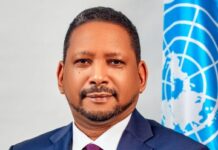Members of the United Nations Security Council on Tuesday called for decisive action against violators of international humanitarian law in armed conflicts.
The call came at a special session of the council to mark the 70th anniversary of the Geneva Conventions agreed by the 196 member states of the UN on Aug. 12, 1949.
Established in the aftermath of the Second World War, the treaty comprised four Conventions and three Additional Protocols, establishing the modern, international legal standards for humanitarian treatment during times of war.
It governs how civilians, prisoners of war, victims of shipwrecks, the sick and wounded are treated by both state and non-state actors in combat.
At Tuesday’s session, various speakers took turns to hail the “significant body of law”, which they said was playing “a vital role in limiting brutality of armed conflicts”.
However, they identified the challenges in implementing the conventions and called for action to ensure compliance.
They noted that international humanitarian law was not sufficiently observed by parties to armed conflicts, particularly in places like Syria, Libya, South Sudan and Ukraine.
In his statement, the President of the Council and Foreign Minister of Poland, Mr Jacek Czaputowicz, said civilians and vulnerable persons, especially women and children, were mostly affected.
Czaputowicz stated that the greatest challenge to protecting human lives in modern conflicts was violation of International Humanitarian Law (IHL) by armed forces and non-state armed groups.
“If existing rules were followed much of the suffering in contemporary conflicts would not occur.
“Poland takes the view that international humanitarian law needs to be protected by way of its implementations,” he said.
He noted that insufficient or even lack of accountability for violations of international humanitarian law “was a systemic weakness that is not new”.
Czaputowicz said it was the role of the international community to ensure that impunity is removed and remedies for victims of violations provided.
The German Minister of Foreign Affairs, Mr Heiko Maas, said the Geneva Conventions remained “one of humanity’s proudest achievements”.
Maas, however, noted that respect for humanitarian law was declining with civilians, humanitarian workers, medical personnel, hospitals and schools coming under attacks.
This, he said, underscored the fact that “we are failing the most vulnerable, and not living up to our legal and ethical obligations”.
“So, let us live up to the principles we all agreed 79 years ago. Let us bring those who attack humanitarian workers and violate the Geneva conventions to justice.
“The perpetrators must know that they will not go unpunished. Let us use our influence to ensure that all parties of conflicts fully respect humanitarian laws and principles,” he said.
Speaking on behalf of the three African members of the council, South Africa’s Jerry Matjila said armed conflicts were “delaying the achievement of peace and security as prerequisite” for continent’s prosperity.
While calling on the council to ensure respect for international humanitarian law by parties to armed conflicts, Matjila stressed the need for the root causes of conflict to be addressed.
Representatives of China, United States and Russia, among others, spoke in similar veins, calling for action to tackle the under-lining causes of conflicts. (NAN)



